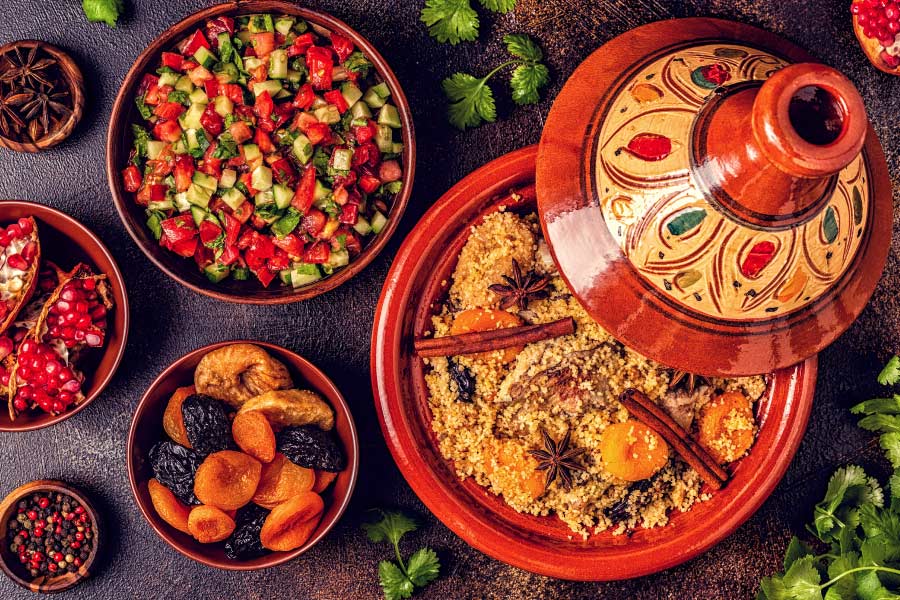Traditional Moroccan Food: A Culinary Journey Every Tourist Must Experience
The streets of Morocco awaken the senses with every step—aromas of simmering spices drift from bustling souks, the clatter of clay tagines echoes from rooftop kitchens, and vendors call out from stalls stacked with colorful produce. Morocco’s culinary heritage is as rich and diverse as its landscapes, shaped by centuries of Berber, Arab, Andalusian, and Mediterranean influences. For tourists seeking an authentic and unforgettable experience, traditional Moroccan food offers a direct connection to the country’s soul.
Whether you’re sipping mint tea in a shaded riad courtyard or savoring a hearty couscous in the High Atlas, each meal tells a story. This guide is designed to take curious, luxury-minded travelers on a flavorful tour of Morocco’s most iconic dishes—revealing where to try them, what makes them special, and how to savor them like a local.
We’re available anytime! Contact us on WhatsApp for instant assistance.
1. Couscous: Morocco’s Culinary Soul
Couscous is more than a dish—it’s a weekly ritual, typically prepared on Fridays as part of family gatherings. Steamed semolina grains form the base, topped with lamb, beef, or chicken and a medley of vegetables like zucchini, carrots, pumpkin, and chickpeas.
A slow-simmered broth flavored with turmeric, ginger, and saffron brings the entire dish together. The result is hearty, fragrant, and comforting. High-end riads and traditional restaurants across Marrakech and Fez serve authentic versions, but for the best experience, try a home-cooked couscous if you’re invited by locals or attend a culinary class.
2. Tagine: The Art of Slow-Cooked Flavor
Named after the clay pot it’s cooked in, tagine is one of the most iconic traditional Moroccan foods. These stews are slow-cooked over charcoal, blending meat or fish with sweet and savory elements—think chicken with preserved lemon and olives, lamb with prunes and almonds, or kefta meatballs in a spicy tomato sauce.
The slow cooking method allows the spices to deepen and the ingredients to blend harmoniously. Don’t miss tasting tagine in the Djemaa el-Fna square in Marrakech or coastal towns like Essaouira, where seafood tagines reflect the local catch.
3. Pastilla: A Luxurious Sweet-Savory Fusion
A dish often reserved for special occasions, pastilla (or bastilla) layers thin pastry with shredded poultry—traditionally pigeon, but now often chicken—mixed with almonds, eggs, cinnamon, and spices. The top is dusted with powdered sugar and more cinnamon, creating a crisp, rich dish that surprises the palate with every bite.
You’ll find this elegant pie at wedding feasts, traditional restaurants, and upscale riads. For a memorable dining experience, book dinner at a riad in Fez known for showcasing historic Moroccan cuisine.
4. Harira: The Nourishing Ramadan Staple
Harira is a spiced tomato and lentil soup that nourishes body and soul, especially during Ramadan when it’s used to break the fast. Made with lentils, chickpeas, lamb, tomatoes, and fresh herbs, it’s both comforting and deeply flavorful. Cinnamon, ginger, and turmeric lend a gentle heat and complexity.
Pair it with dates and chebakia (sesame cookies) for the full experience. While popular year-round, it’s most widely available at dusk during Ramadan, when Moroccan families and restaurants alike offer steaming bowls to end the daily fast.
5. Zaalouk: The Smoky Eggplant Starter
Zaalouk is a warm, garlicky eggplant and tomato salad that often appears as part of a mezze spread. Smoked eggplant is mashed and seasoned with cumin, paprika, garlic, olive oil, and lemon juice. It’s simple, bold, and unforgettable.
It’s usually served with khobz (Moroccan bread) and is a must-try vegetarian option. You’ll find zaalouk in almost every local eatery and in the opening course of many formal meals.
6. Mechoui: A Feast of Fire-Roasted Lamb
For meat lovers, mechoui is a must. This traditional Moroccan food involves roasting a whole lamb—sometimes underground—for hours until the meat is meltingly tender. It’s flavored with cumin, salt, and sometimes garlic or saffron, then pulled apart and served in generous platters.
The best places to enjoy mechoui are local restaurants in Marrakech’s medina or at festive events. Ask a guide or hotel concierge for recommendations for authentic experiences, especially during celebrations like Eid.
Planning Tips for Food-Loving Travelers
Explore with All Five Senses
Traditional Moroccan food isn’t just about taste—it’s about atmosphere, aromas, textures, and stories. Wander through local souks, follow the scent of grilling brochettes, and don’t be afraid to taste what locals are lining up for.
Book a Culinary Class
Join a Moroccan chef for a hands-on class in preparing couscous or tagine. Not only will you eat well, but you’ll take home skills to recreate Morocco’s magic in your own kitchen.
Visit Different Regions
The culinary scene in Tangier differs from that in the Sahara or Chefchaouen. Northern dishes may feature more Mediterranean influence, while southern ones highlight spices and date-based sauces. Ask locals for regional specialties—they’re often proud to share their culinary roots.
Choose Traditional Riads Over Chain Hotels
Riads offer home-cooked meals with family recipes passed down through generations. Many include breakfast or dinner in the booking—don’t skip them. It’s an intimate, authentic way to experience Moroccan hospitality.
Conclusion: A Feast That Stays With You
Exploring traditional Moroccan food is much more than sampling dishes—it’s about experiencing Morocco’s identity through flavor, ritual, and hospitality. Every meal, from a simple bowl of harira to an elaborate lamb tagine, reflects the deep-rooted traditions and the generous spirit of the Moroccan people.
Whether you’re dining under the stars in the Sahara, sipping tea in a riad courtyard, or sharing street food with locals in a busy souk, the country’s culinary heritage will leave a lasting impression on your heart—and your taste buds. So, come hungry, stay curious, and let Morocco’s cuisine lead you on a journey you’ll never forget.
Don’t wait! Get the answers you need now by chatting with us on WhatsApp.



